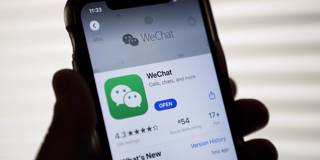In its ongoing war against Chinese technology companies, the Trump administration has now set its sights on China's leading social-media app, WeChat. Yet by opting for a ban, the US has once again prioritized optics over sound policymaking, with costs to America that are all too predictable.
NEW YORK – Shortly after US President Donald Trump issued an executive order effectively banning the Chinese-owned social-media app TikTok, he issued a second order prohibiting “any transaction that is related to WeChat by any person … as identified by the Secretary of Commerce.” According to the White House, the WeChat ban – which will take effect on September 20 – is intended to protect Americans and visiting Chinese in the United States from violations of privacy by the Chinese government and to limit fake news from the Chinese government reaching Americans. But the ban is likely to be counterproductive, and there are better solutions to these problems.
WeChat, owned by Tencent, a Chinese company listed on the Hong Kong Stock Exchange, is a widely used multipurpose app that combines messaging, social media, digital payments, and other functions. If Tencent’s founders, Pony (Huateng) Ma and four other partners, had built their company in the US, they would be celebrated in much the same way that Bill Gates, Jeff Bezos, and Elon Musk are.
Chinese entrepreneurs likely have had to overcome much greater difficulties to succeed than their American counterparts. After all, funding for those without family wealth or political connections is scanter in China due to a less developed capital market. Property rights protection is weaker, and Chinese Internet users’ purchasing power is much lower than that of Americans. In 1998, when Tencent was founded, China’s per capita income was a mere $850 – less than 5% of the US level and less than 20% of the Mexican level that year.

NEW YORK – Shortly after US President Donald Trump issued an executive order effectively banning the Chinese-owned social-media app TikTok, he issued a second order prohibiting “any transaction that is related to WeChat by any person … as identified by the Secretary of Commerce.” According to the White House, the WeChat ban – which will take effect on September 20 – is intended to protect Americans and visiting Chinese in the United States from violations of privacy by the Chinese government and to limit fake news from the Chinese government reaching Americans. But the ban is likely to be counterproductive, and there are better solutions to these problems.
WeChat, owned by Tencent, a Chinese company listed on the Hong Kong Stock Exchange, is a widely used multipurpose app that combines messaging, social media, digital payments, and other functions. If Tencent’s founders, Pony (Huateng) Ma and four other partners, had built their company in the US, they would be celebrated in much the same way that Bill Gates, Jeff Bezos, and Elon Musk are.
Chinese entrepreneurs likely have had to overcome much greater difficulties to succeed than their American counterparts. After all, funding for those without family wealth or political connections is scanter in China due to a less developed capital market. Property rights protection is weaker, and Chinese Internet users’ purchasing power is much lower than that of Americans. In 1998, when Tencent was founded, China’s per capita income was a mere $850 – less than 5% of the US level and less than 20% of the Mexican level that year.